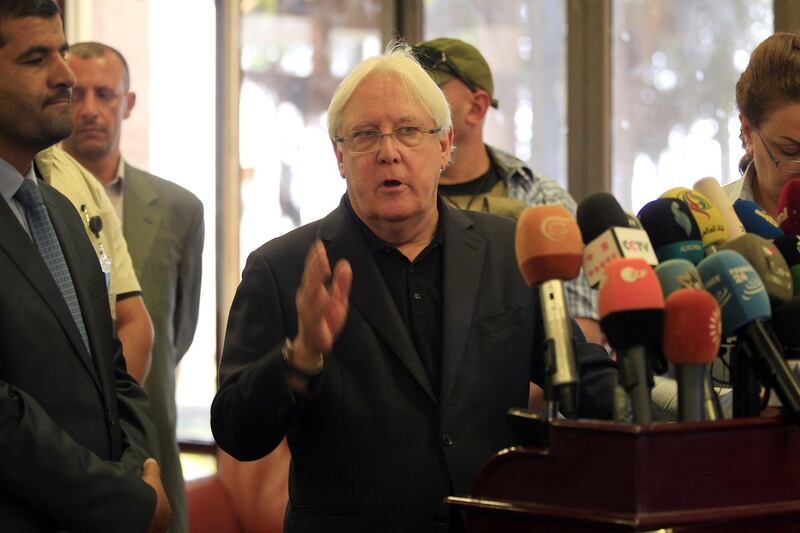A United Nations peace plan for Yemen calls on the Houthi rebels to give up their ballistic missiles in return for an end to a bombing campaign against them by a Saudi-led coalition and a transitional governance agreement, according to a draft of the document and sources.
The plan, which has not yet been made public and could still be modified, is the latest effort to end Yemen's three-year-old civil war, which has spawned one of the world's worst humanitarian calamities.
The conflict pits the Iran-aligned Houthis, who took control of the capital Sanaa in 2014, against other Yemeni forces backed by a coalition led by US allies Saudi Arabia and the UAE. The coalition fears the Houthis are part of a regional power grab by Tehran.
Earlier efforts to end the conflict, which according to the UN has killed more than 10,000 people, have failed. It is unclear whether the new plan will fare any better given the divergent interests of fighters and international backers.
A draft document seen by Reuters and confirmed by two sources familiar with it says that as a step towards new security arrangements, "Heavy and medium weapons including ballistic missiles shall be handed over by non-state military actors in an orderly and planned fashion."
"No armed groups shall be exempt from disarmament," it says.
The sources confirmed that the language included the Houthis, who have launched ballistic missiles at neighbouring Saudi Arabia.
The document also cites plans to create a transitional government, in which "political components shall be adequately represented", in an apparent nod to the Houthis, who would be unlikely to cede Sanaa without participation in a future government.
"The intention is to link security and political aspects starting with a cessation of fighting … then to move towards a withdrawal of forces and the formation of a national unity government. This last objective could possibly be the hardest," one of the sources said.
The peace plan was drafted by UN Special Envoy Martin Griffiths, who is due to present a "framework for negotiations" in Yemen by mid-June.
Anwar Gargash, Minister of State for Foreign Affairs, signalled Abu Dhabi's desire to support Mr Griffiths's efforts.
"Politically, there is a necessity to back the UN effort. It will ultimately mean a transition, to a new political order in Yemen. Clearly with the UN effort, the military and political process will see the Houthis pull out of urban centres," he told The National.
_____________
Read more
UN envoy 'concerned' by fate of Yemen's rebel-held Al Hodeidah
Saudi Arabia intercepts new Houthi missile from Yemen
Houthis using children as human shields in Yemen's Al Hodeidah, Arab coalition says
_____________
UAE-backed Yemeni forces and the Houthis are in a standoff over the Houthi-controlled Red Sea port of Hodeidah.
The Yemeni forces, who are loyal to Yemeni President Abdrabu Mansur Hadi, have moved to within 10 kilometres of Hodeidah, a lifeline for humanitarian supplies.
Mr Griffiths is in the Middle East working on a separate deal to stave off an assault on Hodeidah.
The wider peace plan appears designed to win a quick ceasefire while leaving many thorny issues for later negotiation.
Issues such as constitutional and electoral processes, and reconciliation among the sides would be dealt with later as part of a transition agenda, it says.
The draft document calls for establishing an inclusive transition government, led by an agreed-upon prime minister, "in which political components shall be adequately represented".
The plan offers no further detail on how much representation the Houthis might receive in such a transition government.
A national military council would oversee steps for "phased withdrawal of armed groups from specific areas" and the handover of weapons, including ballistic missiles.
UN-backed peace talks between the Houthis and the Yemeni government were last held in Kuwait in August 2016.
Meanwhile, the International Committee of the Red Cross (ICRC) said on Thursday it had pulled 71 international staff out of Yemen because of security incidents and threats, moving them to Djibouti.
"Our current activities have been blocked, threatened and directly targeted in recent weeks, and we see a vigorous attempt to instrumentalise our organisation as a pawn in the conflict," the ICRC said.
"While the Yemen delegation has received numerous threats in the past, we cannot now accept additional risk less than two months after a gunman killed a staff member.
A Lebanese ICRC employee was killed on April 21 by an unknown gunmen who opened fire on his car in the south-western city of Taez as he was on his way to visit a prison.
A spokeswoman said those withdrawn represented more than half of the ICRC's international staff in Yemen, but the organisation still had 452 workers in the country, including Yemeni citizens.





